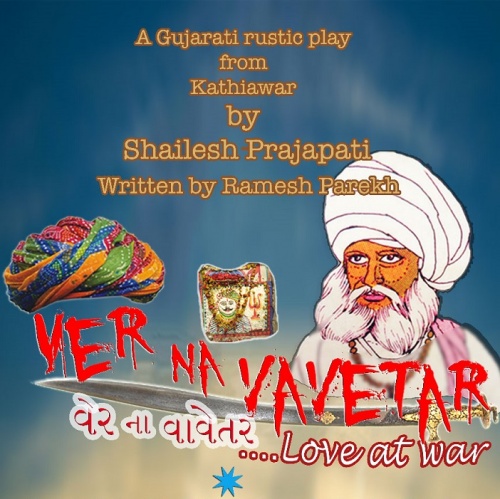VER NA VAVETAR Love at war
16/05/2015 - 24/05/2015
Production Details
What Mahatma Gandhi said about “Anger is the enemy of non-violence AND pride is a monster that swallows it up” is reflected in the Indian Theatre Festival 2015’s Gujarati Play Ver na Vavetar – love at war…
A beautiful costume-drama featuring Gujarati’s own Kathiawar/Gujarat by 30-35 local talents on the stage with action, dances and songs from rural part of Gujarat, India.
It’s a story of two lovebirds of different enemy families (or caste), which brings brutal fight between to communities where a “BHAGAT” family tries to stop it sacrificing their own lives and tells us that” Non-Violence requires a double faith, faith in God and also faith in man”, what Mahatma Gandhi said to us.
Playhouse Theatre, Glen Eden
Saturday 16 May 2015, 7pm
Sunday 24 May 2015, 4pm
CAST
Vejo: Shailesh Prajapati
Kari: Leela Patel
Ranmal: Chiragsinh Solanki
Dheli: Rupal Solanki
lakhman: Rohan
Lakhi: Lajja Prajapati
Rano: Mayur
Labhu: Ritesh Vaghela
Hothido: Mihir Gajjar
Santok: Sonal Bhavsar – Joshi
Mini: Shital Pandya
Parbhu Gor: Devang Chauhan
Harbham: Rahul Redey
Jivo: Parthiv
Graamjan(villagers): Pankaj , Utsav , Parin
Graamjan Stree: Alifiya , Hina
Kids: Siddhraj, Aliza , Salomi
CREW
Assistant Director: Devang Chauhan
Dance Director: Hina Dalwadi & Ritesh Vaghela
Music: Chaitanya Rajapurkar
Lighting: Kedar Divekar
Backstage: Hina, Shital , Mayur , Rohan , Mihir , Utsav , Parin
Music By: Deval Mehta
Set Design: Kabir thakor
Costumes: Pauravi Joshi
Publicity design: Sailesh Prajapati
Set building: Santanu Ghosh and Nimrita Ghosh
Marketing & Publicity: Babla Benerji , Pavitra Roy
Producers: Sailesh Prajapati & Chirag Solanki
Theatre ,
Two performances only
The Gandhi legacy
Review by Mihir Mistry 17th May 2015
If there is one human emotion that has challenged and often vanquished life itself, it is vengeance. As powerful as love and the simple act of forgiveness, revenge has shaped us, our thinking, our cultures, customs, beliefs and our boundaries.
Ver na Vavetar or Seed of Revenge, is a Gujarati stage drama that lays bare this chilling facet of human nature and one man’s attempt to stop this chain reaction. But for that he has to defeat his own thinking and that of his people, who have made a living out of the sword. His people had evolved through the middle ages in the Indian sub-continent to wage wars, protect territories and be the last and most potent line of defence for the kings and sultans who ruled small fiefdoms across the land.
Ver na Vavetar is the story of a blind Vejo (a.k.a Rana or chief, played by Shailesh Prajapati) belonging to the Maher community, who has lived a life of valour and had stories to rival that of the bravest of the land. But age and disability lead him to think differently and eventually refuse to avenge the murder of his young son.
But Rana’s revolt against his people’s custom of taking revenge and living by the sword can only be expected from a man of Porbander. Because this impoverished and unforgiving corner of Gujarat has not only been known to churn out notorious underworld dons, warlords and warring clans, but also the ultimate champion of world peace: Mahatma Gandhi.
But just as the proverbial wheel of time sometimes brings a man back to face the same ghosts, tragedy strikes the Rana household once again. Will Rana and his people fall into the trap and reignite the chain reaction?
On the face of it, this appears to be a 3-hour play loaded with heavy duty emotions and drama but when it is a Rangmanch production one can expect loads of light moments, thanks to some witty repartee and a string of funny Gujarati proverbs. Shailesh and Roopal Solanki – who play Dheli, a.k.a Gagi or naïve – have made this aspect of any Rangmanch their own.
The Maher dialect of spoken Gujarati language is very distinct and even for those living in present day Porbander, deciphering it can be a veritable nightmare. But given none of this production’s artists belong to the community and many are not even Gujarati speaking, to pull off a three hour long play without missing a line should get the critics award for its linguistic originality. This also means those with rudimentary Gujarati language skills take a while to get the punch lines which are mostly delivered in the Maher dialect.
Copyright © in the review belongs to the reviewer





Comments